
 Flash News
Flash News
Gunfire in Durres, a 30-year-old man is injured
Accident on Arbri Street, car goes off the road, two injured
Arrests of "Bankers Petrolium", Prosecution provides details: Exported and sold 532 billion lek of oil, caused millions of euros in damage to the state
Ndahet nga jeta tragjikisht në moshën 28-vjeçare ylli i Liverpool, Diogo Jota
Posta e mëngjesit/ Me 2 rreshta: Çfarë pati rëndësi dje në Shqipëri

The Czech Republic and Slovakia formed a common state in the center of Europe for more than seventy years until 1993, with the exception of the years of World War II. In 1992, Czechoslovakia disintegrated. But after the split, the two countries entered into extensive intergovernmental agreements in 2000, four years before they joined the EU. These have created relations, especially in the linguistic and social fields, which go beyond common EU membership: Slovak and Czech are recognized in both countries as "generally understood languages" that students can use in the other country to study or citizens to communicate with the authorities. The Slovak and Czech governments meet in joint meetings, and the first foreign trips of new presidents, prime ministers and ministers are always to Prague and Bratislava.
Even on the international stage, the two countries have so far mostly moved in sync, or at least very close to each other. Except for the period immediately after the breakup of Czechoslovakia, when the nationalist and authoritarian regime of former Prime Minister Vladimir Meciar (1993-1998) made Slovakia the "black hole of Europe" and excluded it from the first wave of NATO enlargement as well as from integration into the European Union, because it did not meet the democratic criteria.
Fico: Not a bullet for Ukraine
With the new Slovak cabinet led by Robert Fico's national-conservative Smer party taking office, which won elections in late September, the question of whether Prague and Bratislava will face a repeat of the Meciar era seems possible. And if, as one Prague diplomat said, "if Slovakia will succeed in remaining in the Czech orbit." Or whether Hungarian authoritarian leader Viktor Orban, who repeatedly and unequivocally backed Fico before the election, will pull the new Slovak government to his side.
The main point of conflict is helping Ukraine against Russian aggression. The Czech Republic has been and remains one of the main supporters of Ukraine, both in terms of arms shipments and financial and humanitarian aid. Czech Prime Minister Petr Fiala was one of the first three European heads of state to visit Kyiv on March 15, 2022 , immediately after the start of Russia's war of aggression against Ukraine. The new Slovak Prime Minister Fico, on the other hand, wants to end aid to Ukraine. One of the election slogans of his Smer party was "Not one more bullet for Ukraine". He also made similar statements after the election and said in early October that "the roots of the war in Ukraine go back to 2014, when Ukrainian fascists killed civilians of Russian nationality."
Prague judges based on actions
However, these harsh statements have been followed up with little action so far, especially due to diplomatic pressure exerted by the Czech Republic. From the first trips of Slovak politicians who, as usual, went to Prague, it became clear that the rejection of aid to Ukraine is not so obvious.
The government in Bratislava will not cancel any contracts entered into for the delivery of arms and ammunition to Ukraine, including those of the state arms factories. "Everything that takes place on a commercial basis remains unchanged and will continue as before," declared the new Slovak Foreign Minister, Juraj Blanar, on November 6, 2023 in Prague, after a meeting with his Czech counterpart Jan Lipavsky. "Slovakia has provided significant humanitarian aid to Ukraine and we want to continue this aid".
In this aid, the new Slovak government also includes demining, for which Bratislava offers Kiev the help of Slovak specialists.
In early November, the new government flatly rejected military aid in the form of 40 million euros worth of ammunition from the Slovak army stocks, planned by the previous government.
But in Prague, we are impressed with this "I don't judge by words, but by actions," Czech Foreign Minister Jan Lipavsky told DW. "The delivery of Slovak ammunition to Ukraine, which is not negligible, continues."
Fico wants to come to Prague
Czech Prime Minister Petr Fiala is also trying to reach out to the new government in Bratislava. He met with Fico on the sidelines of the European Union summit in October 2023. "We will have different views on a number of foreign policy issues, that's true," he said after the meeting. "We may have different ideas on this or that topic, but we must look for a common language, it is our duty and this is how I approach this issue". The two heads of government agreed that Fico should go to Prague as soon as possible. possible for his first traditional trip abroad November 24 was mentioned.
According to diplomatic sources, the main obstacle is Fico's request to be received by President Petr Pavel. General Pavel, chairman of NATO's military committee until 2018, is clearly pro-Ukrainian. According to diplomatic circles in Prague, the two governments are currently negotiating a public statement from Fico in favor of Kiev.
Czechs love Visegrad only with Tusk
In other areas too, Prague is trying to diplomatically push Slovakia away from Viktor Orbán. Thus, the Czech government, which currently chairs the Visegrad group of countries, rejected Fico's request to convene a summit of V4 prime ministers and foreign ministers. Fico wanted to force the Visegrad countries, Poland, the Czech Republic, Slovakia and Hungary, to jointly reject the European pact on migration. Both Hungary and the outgoing PiS government in Warsaw are against the migration pact. The Czech Republic, on the other hand, supports it.
Prague rejected the Slovak request and said it would welcome a new Polish government led by the pro-European leader of the current Polish opposition, Donald Tusk. "We don't want to meet just for the sake of meeting, but to deal with real politics in Central Europe," it said. Experts believe that with Tusk, Poland and the Czech Republic will together try to put pressure on Fico and isolate Orban within the Visegrad Group.
Hungary is also making efforts
Hungary knows this well. This is why Hungarian Foreign Minister Peter Szijjarto rushed to Bratislava on 07.11.2023, immediately after Blanar's visit to Prague, to meet his Slovak counterpart: "We do not forget the value of a good neighborliness with Hungary", said Blanar after the meeting. But for now, even after the first weeks of the Fico government, Slovakia continues to give first place to the Czech Republic. And in doing so, the Fico government also chooses the current Czech pro-European and, to some extent, pro-Ukraine direction./DW
Latest news



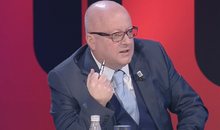


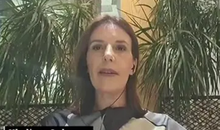

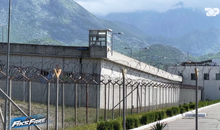

Greece imposes fee to visit Santorini, how many euros tourists must pay
2025-07-03 20:50:37
Don't make fun of the highlanders, Elisa!
2025-07-03 20:43:43
Gunfire in Durres, a 30-year-old man is injured
2025-07-03 20:30:52

The recount in Fier cast doubt on the integrity of the vote
2025-07-03 20:09:03


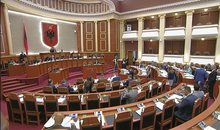

Heatwave has left at least 9 dead this week in Europe
2025-07-03 19:00:01

Oil exploitation, Bankers accused of 20-year fraud scheme
2025-07-03 18:33:52
Three drinks that make you sweat less in the summer
2025-07-03 18:19:35
What we know so far about the deaths of Diogo Jota and his brother André Silva
2025-07-03 18:01:56



Another heat wave is expected to grip Europe
2025-07-03 17:10:58

Accident on Arbri Street, car goes off the road, two injured
2025-07-03 16:45:27

Accused of two murders, England says "NO" to Ilirjan Zeqaj's extradition
2025-07-03 16:25:05





Gaza rescue teams: Israeli forces killed 25 people, 12 in shelters
2025-07-03 15:08:43
Diddy's trial ends, producer denied bail
2025-07-03 15:02:41

Agricultural production costs are rising rapidly, 4.8% in 2024
2025-07-03 14:55:13
Warning signs of poor blood circulation
2025-07-03 14:49:47
Croatia recommends its citizens not to travel to Serbia
2025-07-03 14:31:19
Berisha: Albania is the blackest stain in Europe for the export of emigrants
2025-07-03 14:20:19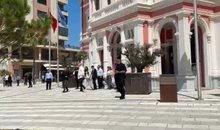

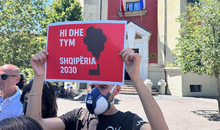
'Ministry of Smoke': Activists Blame Government for Wasteland Fires
2025-07-03 13:59:09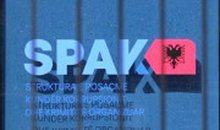

AFF message of condolences for the tragic loss of Diogo Jota and his brother
2025-07-03 13:41:36
Five healthy foods you should add to your diet
2025-07-03 13:30:19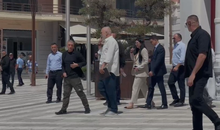
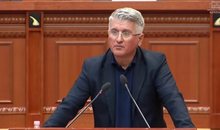


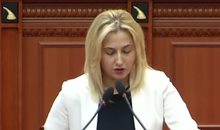


A unique summer season, full of rhythm and rewards for Credins bank customers!
2025-07-03 12:12:20

Fire situation in the country, 29 fires reported in 24 hours
2025-07-03 12:00:04
The constitution of the Kosovo Assembly fails for the 41st time
2025-07-03 11:59:57
The gendering of politics
2025-07-03 11:48:36
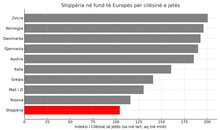
The price we pay after the "elections"
2025-07-03 11:25:39
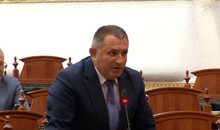
Xhafa: The fire at the Elbasan landfill was deliberately lit to destroy evidence
2025-07-03 11:08:43

The 3 zodiac signs that will have financial growth during July
2025-07-03 10:48:01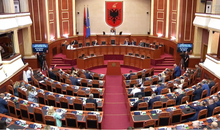
Democratic MP talks about the incinerator, Spiropali turns off her microphone
2025-07-03 10:39:24

Ndahet nga jeta tragjikisht në moshën 28-vjeçare ylli i Liverpool, Diogo Jota
2025-07-03 10:21:03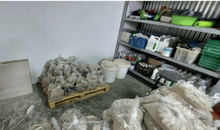
Cocaine trafficking network in Greece, including Albanians, uncovered
2025-07-03 10:10:12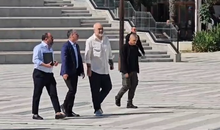


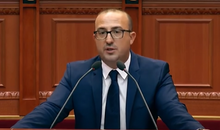
Korreshi: Election manipulation began long before the voting date
2025-07-03 09:39:13
Arrest of Greek customs officer 'paralyzes' vehicle traffic at Qafë Botë
2025-07-03 09:28:41
After Tirana and Fier, the boxes are opened in Durrës today
2025-07-03 09:21:10
Enea Mihaj transfers to the USA, will play as an opponent of Messi and Uzun
2025-07-03 09:10:04

Foreign exchange, the rate at which foreign currencies are sold and bought
2025-07-03 08:53:50
Index, Albania has the worst quality of life in Europe
2025-07-03 08:48:10
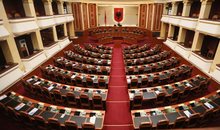
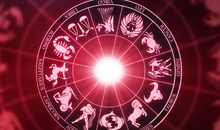
Horoscope, what do the stars have in store for you today?
2025-07-03 08:17:05
Clear weather and high temperatures, here's the forecast for this Thursday
2025-07-03 08:00:37
Posta e mëngjesit/ Me 2 rreshta: Çfarë pati rëndësi dje në Shqipëri
2025-07-03 07:46:48



Lufta në Gaza/ Pse Netanyahu do vetëm një armëpushim 60-ditor, jo të përhershëm?
2025-07-02 21:56:08
US suspends some military aid to Ukraine
2025-07-02 21:40:55



Methadone shortage, users return to heroin: We steal to buy it
2025-07-02 20:57:35
Government enters oil market, Rama: New price for consumers
2025-07-02 20:43:30
WHO calls for 50% price hike for tobacco, alcohol and sugary drinks
2025-07-02 20:41:53



